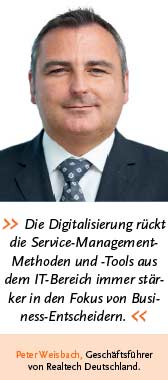SolMan to the fullest


IT Service Management, ITSM, what is it? A warmed-over ITIL or a new mega-trend?
 Peter WeisbachIT Service Management is a way for IT to organize itself.
Peter WeisbachIT Service Management is a way for IT to organize itself.
The IT Infrastructure Library (ITIL) forms the basis of this framework. ITSM took a major step forward with its introduction 15 years ago.
Originating from asset management and the helpdesk, the ITSM market has now reached a very high level of maturity. Over time, concepts such as Configuration Management Database (CMDB), Business Service Management and later Big Data have been added.
Driven by the digital transformation and the associated increase in demand for automated processes throughout the company, IT service management is currently evolving into enterprise service management.
How do you assess the current process maturity and quality of ITSM tools and which ones are available?
Weisbach: Process maturity in IT service management has risen sharply in recent years.
There are now numerous powerful ITSM solutions that can be easily integrated into existing landscapes and whose process coverage is based on ITIL; examples include service desks with incident, problem and change management.
As of today, around 85 percent of medium-sized and large companies in Germany rely on ITIL for IT service management.
Nevertheless, there is potential for optimization. For efficient service management, it is very important - regardless of the tool - that key processes in the company are defined and the key figures developed from them are known.
However, recognizing and then describing the relevant processes is very time-consuming.
There are thousands of standard processes in SAP applications, for example. It would be a real added value if service management software could already provide the essential processes and possibly one or two key figures as a basis. We still see many opportunities here.
How and where is ITSM relevant for an existing SAP customer who is completely satisfied with SolMan?
Weisbach: In principle, ITSM is relevant for every company.
SAP Solution Manager offers SAP customers a comprehensive portfolio that can be used to map all ITSM topics. The application is certified in 15 ITIL processes for service provision.
This gives SAP customers the most important ITSM tool at their fingertips. There is also the option of making better use of the potential of Solution Manager with selected add-ons.
One example of this is Realtech vSIM. The add-on allows services, service objects and their relationships to be automatically recorded, visualized and modelled in the Solution Manager.
The result: More transparency, more efficiency, greater business benefits. Nevertheless, the next market trend, Enterprise Service Management (ESM), is just around the corner.
What are the differences? What trend do you recognize?
Weisbach: Enterprise Service Management stands for the servicing of the entire company.
Digitalization is bringing service management methods and tools from the IT sector more and more into the focus of business decision-makers. They want to transfer the service concept that we know from IT to the entire company.
In other words, all specialist departments should and want to standardize their services in such a way that services from different departments can be used and planned efficiently, conveniently and with consistent quality.
The specialist departments will therefore be both service suppliers and service users in the future.
This development is supported by increasing automation, which makes it ever easier to introduce new IT solutions in companies.
Business Service Management and ITIL have already tried to bridge the gap between IT and business - how is Enterprise Service Management different?
Weisbach: Business Service Management (BSM) has made it possible to visualize business-relevant IT processes and the associated services.
The aim was to improve coordination between IT and business and to know which business processes depend on which IT processes.
Enterprise Service Management will be the next step: In the coming years, a wide variety of business processes will increasingly be included alongside IT processes.
This development is being driven by the rapid advance of automation, which is much more advanced today than it was a few years ago in BSM. A development that is already visible in many specialist departments.
How will the market for Enterprise Service Management develop in the SAP community?
Weisbach: ESM is a growth market that is becoming increasingly important - for SAP customers and non-SAP customers alike.
A strong driver for the ESM market is clearly digitalization, which is transforming entire markets and companies, especially the industry.
While many companies have previously supplied products and technologies, they are increasingly having to provide services.
Services are also becoming more important within companies beyond IT - the answer is efficient enterprise service management.
However, in order to map more and more cross-company processes and services outside of IT, all companies, including SAP customers, must develop or expand their digital skills.
What role will IT play in this?
Weisbach: IT can play a real pioneering role here, as it can contribute valuable experience - after all, it has been organizing its processes and services according to ITIL specifications for many years.
In addition, experienced technology companies such as Realtech can support IT on the path to digital transformation with expertise ranging from ITSM to BSM and ESM.
ESM will expand the area of application of SAP Solution Manager. Existing SAP customers will therefore benefit from ESM in the same way as other companies: by standardizing and automating their processes beyond IT.
This improves their efficiency, creates cross-departmental transparency and reduces effort and costs. The business benefits will inevitably increase.
In particular, solutions that complement SAP Service Management can offer SAP customers great added value. These make it possible, for example, to record and visualize data and provide service management tools - all largely automated.
What importance will SAP, its partners and existing customers attach to the ESM by 2025?
Weisbach: The importance of ESM will continue to grow in the coming years. No company will be able to ignore the development towards ESM - regardless of which solution they work with.
SAP will also follow the digitalization trend and increasingly offer additional services to complement SAP Solution Manager.
A DSAG survey recently revealed that the digital transformation has also arrived at existing SAP companies.
Around 80 percent of the companies surveyed attach great or very great importance to it.
They expect the greatest impact to be in the areas of business processes, workflows and customer access - in other words, important areas of ESM.
A study by Research in Action, RIA, recently described Realtech as the go-to company for SAP customers.
What sets you apart from other providers?
Weisbach: Coming from ITSM, Realtech offers a comprehensive service management portfolio.
We are particularly strong in the area of data process integration, i.e. the automated collection and provision of data.
Added to this is our long-standing technology partnership with SAP, on which our extensive expertise in SAP Solution Manager is based.
This special combination allows us to build intelligent bridges between SAP and service management processes. If you look at the German market, there is no other German company with a similar offering.
Just like our own products and services, we will also focus our solutions for SAP customers even more strongly on the area of Enterprise Service Management in future - in a modular way, so that customers can decide for themselves when they take which step in their service process.
We expect demand from the SAP environment to increase in the future.





